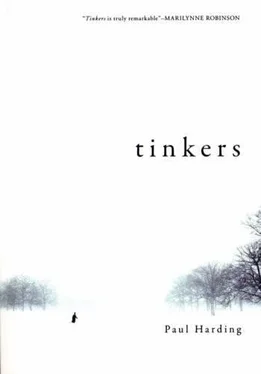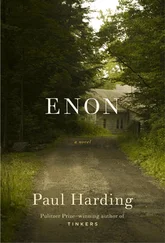No woman ever bought a piece of jewelry. One might lift a pendant from its bed and rub it between her fingers. She would say, It sure is, when he said, Well, now, that's a beautiful piece. Sometimes he saw a woman's face seize for the slightest part of a second, the jewelry stirring some half-forgotten personal hope, some dream from the distant cusp of marriage. Or her breath would hitch, as if something long hung on a nail or staked to a chain seemed to uncatch, but only for a second. The woman would hand back the trinket he offered. No, no, I guess not, Howard. Case slipped back into its drawer, he would turn his cart around in the yard and start back out of the woods, winter already sealing the country people in behind him.
The local agent for Howard's supplies was a man named Cullen. Cullen was a hustler. One day a month, he sat at a table in the back room at Sander's store and rooked his agent of his due. He spread Howard's receipts for the month out across the table and leaned forward and looked at them through the smoke of the cigarette that always dangled from his lip. When he did this, Howard always thought that the agent looked like he was dealing cards for a hand of poker or a magic trick. Cullen squinted at the receipts: Only five boxes of lye; need six to make discount. Ten cotton mop heads. Good, but my cost went up. Need to sell a dozen now. You get a nickel less than before. What about that new soap? I don't care it's tough to convert these backwoods biddies; you're a salesman. What the hell are you doing out there? Sniffing daisies? Godammit, Crosby, what are you doing with those iceboxes and washing machines? How many brochures have you handed out? I don't give a good goddamn if they don't understand installment plansinstallment is the future; it is the grail of selling! Cullen scooped up the receipts and crammed them into his case. He reached into his pocket and pulled out a roll of money. He peeled a ten and seven ones out of the roll. He dug in his other pocket and pitched a fistful of change onto the table (like dice, Howard thought) and flicked fifty-seven cents' worth of coins out of the pile with a forefinger and put the rest back in his pocket so quickly, it was as if that, too, were one of his tricks. Sign here. Crosby, how are you going to be one of my twelve? This was the part of every meeting with the agent that Howard dreaded-when Cullen quoted Bruce Barton. Who was the greatest businessman ever, Crosby? The greatest salesman? Advertiser? Who? Howard looked at the knot in Cullen's cheap tie and smiled, trying not to look put out but trying not to answer the question, either. Come on, Crosby. Haven't you read the book? I practically gave it to you for cost! Howard sighed and said, It was Jesus. That's right, the agent said, half getting out of his chair, pounding a fist on the table, pointing a finger out toward heaven, past the new snowshoes hanging high on the walls. Jesus! Jesus was the founder of modern business, he quoted. He was the most popular dinner guest in Jerusalem. He picked up twelve men from the bottom ranks of business and forged them into an organization that conquered the world! How are you going to be one of my twelve, Crosby, if you can't sell, if you are not on fire to sell?
One hundred and thirty-two hours before he died, George awoke from the racket of the collapsing universe to the darkness of night and a silence, which, once the clamor of his nightmares faded, he could not understand. The room was lit only by a small pewter lamp set on one of the end tables near the couch. The couch ran along the length of the hospital bed. At the far end of the couch, leaning toward the light on the table, sat one of his grandsons, reading a book.
George said, Charlie.
Charlie said, Gramp, and put the paperback book on his lap.
George said, Why so damn quiet?
Charlie said, It's late.
George said, Is that right? Still seems awful damn quiet. George turned his head to the left and then right. To the left was the Queen Anne armchair and the fireplace in which he had not built a fire for thirty years, not since he quit smoking pipes. He remembered the pipe tree he had kept in the basement, at his work desk. At first he had imagined his enthusiasm for pipes to be like that which he had for clocks; he had bought the pipe tree at a flea market in Newburyport. How do I remember this? he thought in the bed, concerned with parsing the quality of the silence he experienced almost as a noise, of finding its source, and, instead, here was the flea market in Newburyport and the table of junk with the pipe tree and what the old crook who ran the table looked like (some sort of retired sailor or merchant seaman, with an Irish sweater and Greek fishing cap) and sounded like (salt-cured Yankee via Bangor via Cape Breton) and almost every item on the table (rusted trowels, eyeless dolls, empty tobacco tins, flaking sheaves of sheet music, a candy thermometer, a statue of Christopher Columbus) and how he had bartered with the man for the tree (How close to ten cents would you take for that pipe tree? Five bucks! How'd a thief like you get in here? Two bucks? Well, you'd better hold on to it a while longer. A dollar and a quarter? Sold.). He bought a dozen pipes from various collectors. He put them in the tree, with the intention of cultivating a taste for a range of expensive tobaccos and using each pipe for one type of tobacco only. Within a week, he smoked the cheapest house blend from the local tobacconist in a pipe he had bartered as part of a deal for a box full of clock parts, and which, when an occasional puff tasted sour, he suspected of being made not from wood, but plastic. He smoked bowl after bowl of cheap shag while he fixed clocks. At the end of the day, after dinner, he sat in the Queen Anne chair (which he had bought cheaply at an estate sale because two of its legs were broken) by the fire and smoked the last bowl of the day. When he developed a precancerous blister on his lower lip, he threw out his pipes and the tree and the tins of tobacco and contented himself with smoking half of an occasional cigar when he had to sweep dead leaves out of the garage. Although he had not sat in the Queen Anne chair since he quit smoking his pipes, there remained a sort of shadow of his outline on the fabric of the chair's backrest; it was not so much a stain as a silhouette of just slightly darker fabric, which could be seen in just the right light from just the right angle, and which still would have fit his shape perfectly, had he been able to rise from his sickbed and sit in the chair.
His head was propped up with pillows. In front of him, at the foot of the bed, he could see a narrow part of the Persian rug that covered the floor. Beyond the rug, at the far wall, was the dining table, with its leaves taken out and its wings lowered. It ran nearly the width of the wall. At either end of the table was a ladder-back chair with a cane seat. Hanging above the table (on which there was always a bowl of wooden fruit or a crystal vase of silk flowers) was a still life done in oil. It was a dim, murky scene, lit perhaps by a single candle not visible within the frame, of a table on which lay a silver fish and a dark loaf of bread on a cutting board, a round of ruddy cheese, a bisected orange with both halves arranged with their cross sections facing the viewer, a drinking goblet made of green glass, with a wide spiral stem and what looked like glass buttons fixed around the base of the broad cup. A large part of the cup had been broken and dimly glinting slivers of glass lay around the base. There was a pewter-handled knife on the cutting board, in front of the fish and the loaf. There was also a black rod of some sort, with a white tip, running parallel to the knife. No one had ever been able to figure out what the rod actually was. A grandchild once remarked that it looked like a magician's wand, and, in fact, the object did resemble the type of wand that amateurs use to conjure rabbits or make pitchers of water disappear into their top hats at children's birthday parties. But the rest of the picture, no matter how recently or distantly it had been painted, was by influence or origin Dutch or Flemish, and the rod certainly not a pun or clever joke. And so it remained a small household mystery, which the family was content to puzzle over now and then for a moment when they were waiting for someone to get his coat on, or were daydreaming on the couch during a winter afternoon, and which no one cared to research.
Читать дальше












